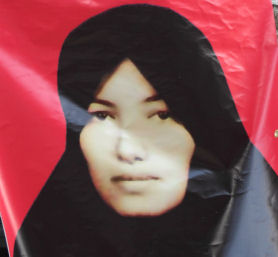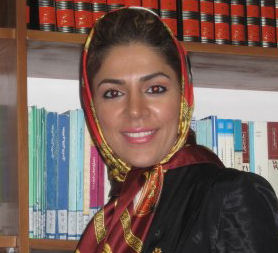Iran stoning: TV confession criticised
A TV confession by Sakineh Mohammadi Ashtiani, who faces death by stoning in Iran, has been criticised by human rights groups. There is also concern that another one of her lawyers has been arrested.

Self-incriminating statements by her son and two German journalists were also shown on Iranian TV on Monday night.
Sakineh Mohammadi Ashtiani was sentenced to death by stoning in 2007 for adultery and involvement in her husband’s murder.
In this latest confession the 43-year old described herself as a “sinner”.
We believe these statements were made under duress. Amnesty International
Her face is blurred in the video.
Ms Ashtiani goes on to call for those campaigning for her release to stop.
The Iranian embassy has told Channel 4 News Sakineh Mohammadi Ashtiani’s case is currently under review.
The TV confession has been condemned by Amnesty International.
Middle East and North Africa Director Malcolm Smart said: “We believe these statements were made under duress and should not be accepted as evidence.
“Televised confessions should have no bearing on Iran’s legal system.
“The statements form part of a growing catalogue of other forced confessions and self-incriminating statements made by detainees and broadcast on state media.
“Many who have made similar confessions have later retracted them stating that they were coerced, sometimes under torture or other ill-treatment.
“The Iranian authorities must not execute Sakineh Mohammadi Ashtiani by any means and release her if she continues to be held solely on the grounds of consensual sexual relations.”

Lawyer arrested
There are also concerns that another one of Sakineh Mohammadi Ashtiani’s lawyers has been arrested in Iran.
It is reported that three female lawyers and two colleagues were detained on Saturday.
Sara Sabaghian was held along with Maryam Kiyan and Maryam Karbasi after returning from Turkey.
They now face charges of violating moral standards outside Iran.
Iran’s legal system
Under Iran’s penal code, adultery is a “crime against God” for both men and women. It is punishable by 100 lashes for unmarried men and women, but married offenders are sentenced to death by stoning under Article 83.
Adultery must be proven either by repeated confession by the defendant, or the testimony of witnesses – four men or three men and two women.
The penal code is also specific about the manner of execution and types of stones which should be used.
Article 102 says men should be buried up to their waists and women up to their chest, and Article 104 states that the stones used should “not be large enough to kill the person by one or two strikes; nor should they be so small that they could not be defined as stones”.
-
Latest news
-
Laughing Boy: New play tells the tragic tale of Connor Sparrowhawk5m

-
Sewage warning system allows some of worst test results to be left off rating system, analysis shows3m

-
Post Office inquiry: Former CEO didn’t like word “bugs” to refer to faulty IT system4m

-
Israeli soldier speaks out on war in Gaza12m

-
PM’s defence spending boost should be ‘celebrated’, says former Armed Forces Minister4m

-




